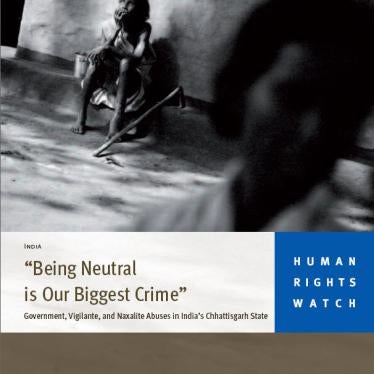January 23, 2009
Chief Minister Navin Patnaik
Government of Orissa
Naveen Nivas,
Aerodrome Road,
Bhubaneswar,
Orissa 751001
Via facsimile: +91 674 2535100
Re: Special Police Officers
Dear Chief Minister:
Human Rights Watch is an international nongovernmental organization that monitors human rights abuses by governments and non-state armed groups in more than 80 countries around the world. I write to express deep concern regarding the Orissa Home Department’s plan to recruit an estimated 2,000 tribal youth as special police officers (SPOs) to counter Naxalite violence in the region. In particular, we are concerned about the use of SPOs for paramilitary purposes, and the possibility that children under the age of 18 may be recruited in violation of the Home Department’s stated age limits.
India’s Police Act, 1861, empowers local magistrates to temporarily appoint civilians as SPOs to perform the roles of “ordinary officers of police.” Such appointments are meant as a stop-gap measure where the police force is otherwise believed to be insufficient. However, the language of the statute does not envision the deployment of SPOs in roles comparable to those played by paramilitary police such as the Central Reserve Police Force and the Indian Reserve Battalions. Section 17 of the Act states that magistrates may appoint SPOs “for such time and within such limits as he shall deem necessary” when “it shall appear that any unlawful assembly, or riot or disturbance of the peace and taken place, or may be reasonably apprehended, and that the police-force ordinarily employed for preserving the peace is not sufficient.”
Home Department officials have been quoted by the press as saying that SPOs in Orissa will be “doing the same things that the SPOs in Chhattisgarh are doing.” An investigation conducted by Human Rights Watch in Chhattisgarh in 2007 and 2008 found that SPOs were routinely deployed alongside paramilitary police on anti-Naxalite combing operations. In fact, police officials in Chhattisgarh admitted that SPOs have been responsible for numerous human rights violations and disciplinary action had to be taken against them. Recently, an inquiry had been ordered into the killing of 17 alleged Naxailites in an encounter in Chhattisgarh’s Dantewada district. Human rights activists said that the encounter was faked and it was villagers that were killed. Several SPOs were involved in this operation.
SPOs received training that was far inferior to that given to civil police. Many SPOs in Chhattisgarh have been killed or injured in armed exchanges with Naxalites and in Naxalite detonations of landmines and improvised explosive devises (IEDs). We also found that SPOs were often targeted for Naxalite reprisals. (The full findings of Human Rights Watch’s report can be found in “Being Neutral is our Biggest Crime: Government, Vigilante, and Naxalite Abuses in India’s Chhattisgarh State,” online at https://www.hrw.org/en/reports/2008/07/14/being-neutral-our-biggest-crime-0)
While the Orissa state government has an obligation to provide for the security of the population against human rights abuses by Naxalites, measures to maintain law and order must be in accordance with both national and international law. However, Indian human rights lawyers who have studied the conflict in Chhattisgarh contend that “the Indian Police Act does not envisage en masse recruitment of SPOs,” and that the deployment of SPOs against Naxalites is a “blatant abuse” of the Police Act. We therefore urge the Orissa government to ensure that SPOs are not deployed in paramilitary operations against Naxalites.
We are also concerned about the possible recruitment of children as SPOs. Our investigation in Chhattisgarh found that police often recruited SPOs with little regard for minimum age standards, and that many children, including some as young as 14, were recruited and used for dangerous armed operations. In some cases, child Naxalites who surrendered to government forces were also used as SPOs, even though still under age 18. Such practices place children at grave risk, and violate India’s obligations under the Optional Protocol to the Convention on the Rights of the Child on the involvement of children in armed conflict, which sets 18 as the minimum age for any direct participation in hostilities. India became a party to the Optional Protocol in 2005.
We urge the Orissa Home Department to ensure that its age guidelines (stipulating that SPOs should be between the ages of 18-25 and have completed eighth standard) are strictly enforced. To avoid underage recruitment, the Home Department should insist on proper age documentation for all SPO applicants, and reject any applicants who cannot produce documents proving that they are at least 18 years of age.
While the Naxalites present a real security threat to the people of Orissa, the Orissa government should ensure that its response to this threat does not give rise to additional human rights violations.
Thank you for considering our recommendations. We would appreciate learning about any steps that you take in this regard.
Sincerely yours,
Brad Adams
Executive Director
Asia Division
Cc: P. Chidambaram, Home Minister, Government of India, North Block, New Delhi 110001; National Human Rights Commission, Faridkot House, Copernicus Marg, New Delhi 110001







